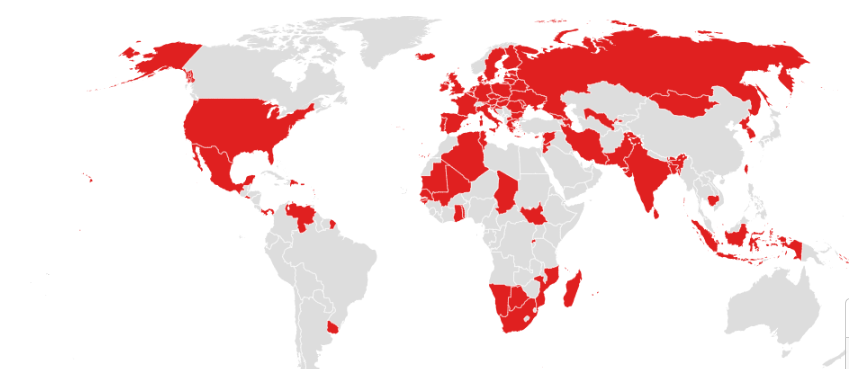
The year 2024 is presented in all media as a “super year of democracy.” This is undoubtedly an exceptional year, considering that there will be more than 80 national elections that will affect 4.2 billion people, more than 50% of the world’s population. According to Foreign Affairs, humanity will not see such a large-scale election cycle again until 2048.

For this reason, there are analysts who believe that the election results will determine the evolution of the world for at least the next decade. Such an assessment is not without meaning at a time when commercial and geopolitical tensions around the world are becoming increasingly threatening and complex. And their solution or deterioration depends on those who will lead the major countries or unions of the world.
But are the number of elections and the number of those who influenced them enough to call 2024 the “year of democracy”? If we list the names of the largest countries involved, India, the USA and Russia, which we have joined the EU, we can conclude that the variety of existing political models deserves nuance, as well as more careful labeling. And it is fair.
The V-Dem Institute is an independent research institute working together with the Department of Political Science at Gothenburg University in Sweden. He is known, among other things, for the annual report he prepares, which analyzes the evolution of democratic standards in more than 170 countries on the basis of a huge database and an impressive number of external collaborators, according to many criteria.
Its latest report is a 2023 report based on information collected in 2022, and its findings are troubling. Autocratic regimes are on the rise around the world.
Division of political models into
a) closed autocracies (democratic principles are not observed),
b) electoral autocracies (democratic principles are imitated and/or implemented to a small extent)
c) electoral democracies (democratic principles are implemented partially, but generally satisfactorily)
d) liberal democracies (all democratic principles are followed)
The report concludes that the level of democracy around the world is declining significantly.
In 2012, 46% of the world’s population lived in an autocracy, so that this percentage will increase to 72% in 2022. In addition, for the first time in more than two decades, the world has more closed autocratic regimes (28% of the population) than liberal democracies (13% of the population).

The balance of economic power is also undergoing profound changes. As the accompanying graph produced by V-Dem shows, 46% of global GDP is achieved in autocratic countries, while the share of trade between democracies has declined from 74% of world trade in 1998 to 47% in 2022. This is a trend. it shows that autocratic countries are becoming less and less commercially dependent on democratic countries, while the dependence of democratic countries on autocratic countries has doubled over the past 30 years. Such developments are even more worrying, as the war in Ukraine has shown us the temptation of autocratic regimes to use resources as a means of political pressure.
The quality of elections deteriorated in 30 countries, press censorship in 47 countries, and repression against civil society organizations increased in 37 countries. Greece is named as one of the countries with the greatest democratic regression. Hungary, Turkey and Serbia, also close to Romania, are considered electoral autocracies.
In this context, an overlay of the liberal democracy index calculated by V-Dem for more than 80 countries due to hold elections in the “super year of democracy” suddenly brings us back down to earth. Only 38% of the population that came to the elections live in democratic countries, and 62% – in countries with an autocratic regime.
Under these conditions, it is worth asking the question: can 2024 be considered a super year of democracy?
The good news is that before the wave of autocratization there are countries that have managed to make a 180-degree turn, returning to democratic regimes. European countries nominated in this regard include Moldova, North Macedonia and Slovenia.
The V-Dem Institute points out that the return to democratic regimes is not an easy process, the more difficult it is to start and end more consolidated and extreme forms of autocracy.
According to V-Dem, there were events that led to the return of autocratization in the analyzed countries
a) mass mobilization of the population against those in power
b) opposition of the judicial system to illegal decisions of the executive power
c) united political opposition supported by civil society
d) change of power as a result of elections with stakes
e) support and protection of international institutions
However, I would like to note that, in contrast to the period under analysis, the main risk now is that, with so much attention paid to the dangers posed by external enemies, real or imagined, voters have a high chance of ignoring or underestimating the enemies of democracy from within .
After all, many autocrats arose out of democratic processes that they then took care to distort to their own advantage or destroy. Regardless of the country, democratic regimes can only survive if they are constantly trained, cultivated and strengthened.
Source: Hot News
Lori Barajas is an accomplished journalist, known for her insightful and thought-provoking writing on economy. She currently works as a writer at 247 news reel. With a passion for understanding the economy, Lori’s writing delves deep into the financial issues that matter most, providing readers with a unique perspective on current events.